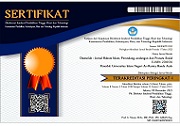CITATIONS
FASAKH NIKAH DENGAN ALASAN SUAMI MISKIN (Studi Perbandingan antara Ulama Syafi’iyyah dan Hukum Positif di Indonesia)
Abstract
In a family sometimes painful actions arise from involuntary causes (not intentionally), not on the wishes of the husband, such as because the husband is poor or poor so he does not have a living to fulfill his wife's rights in the form of food, clothing and home at a certain time, which makes the wife ask to part with her husband through the divorce (fasakh) path. Regarding the problem of the wife asking for fasakh (carrying out divorce) by reason of a poor husband there are differences of opinion between the Syafi'iyyah Ulama and Positive Law in Indonesia concerning the provisions that must be fulfilled by both. This study wants to answer the question of how the provisions of fasakh marriage are based on the reasons of poor husbands according to Syafi'iyyah Ulama and Positive Law in Indonesia. To get answers, the author uses primary data sources and secondary data. The research method that I use is Descriptive Comparative method that is research by analyzing and comparing opinions, reasons and interpretations of the arguments used as the opinions of the two groups. The results of the study indicate that the fasakh of marriage on the grounds of a poor husband according to the Shafi'iyyah Ulama is permissible and validly carried out on condition; 1) A wife who is married between being patient and divorced, 2) Judge's decision, in the form of; a. determination of poor status according to the provisions, b. giving an opportunity to a husband to work for a living, c. Fasakh implementation period three days after the wife reported. 3) Separated by reciting fasakh instead of divorce, and still having three times the right of divorce if in the future you want to remarry with a new contract. Whereas according to Positive Law in Indonesia fasakh marriage by reason of poor and permissible husband with conditions, 1) occur shikak between wife and husband, 2) wife make a divorce letter, 3) Decision judge namely proof of poor husband in a literal manner, 4) Court decision drop one bain sughra talak. From the explanation above, it can be concluded that the provisions of the fasakh of marriage by reason of poor husbands in the opinion of the Syafi'iyyah clerics are better and fair because they are supported by a strong foundation and are most in accordance with the soul, basis and principles of Islamic law. Therefore in Indonesia requires more explicit rules about fasakh (divorce) with the excuse of poor husbands.
Keywords
Fasakh, Poor. Comparative law,
Full Text:
PDFReferences
A. Hamid Sarong, dkk, Fiqh, Banda Aceh: PSW IAIN Ar-Raniry, 2009.
A. W Munawwir, Al-Munawwir, Cet.14, Surabaya: Pustaka Progresif, 1997.
Abdul Rahman Ghozali, Fiqh Munahakat, Jakarta: Kencana, 2012.
Abdurrahman Al-Jaziri, Kitab Fiqh ‘Ala Mazahib Arba’ah, Juz IV, terj. Khatibul Umam, Kairo: Matba’ah Istiqamah, 1996.
Abdussami’ Ahmad Imam, Pengantar Studi Perbandingan Madzhab, terj. Yasir Maqasid, Jakarta: Pustaka Al-Kautsar, 2016.
Abí Dáwud Sulayman, Sunan Abí Dáwud, Riyaḍ: Baitu al-Fikr al-Dauliyat, 1998.
Abu Syuja’ Ahmad bin Husain, Matan Fikih Mazhab Syafi’i, terj. D.A. Pakihsati, Solo: Al-Wafi, 2015.
Agustin Hanafi, Perceraian dalam Perspektif Fiqih dan Perundang-Undangan Indonesia, Banda Aceh: Lembaga Naskah Aceh, 2013.
Ahmad bin Hambal, Musnad al-Imámi al-Hafiẓi Abi ‘Abdullah Ahmad bin Hanbal, Riyaḍ: Baitu al-Fikr al-Dauliyat, 1998.
Ahmad Zainuddin bin Abdul Al-‘Azízi al-Ma’bariyyi al-Malíbariyyi al-Fanání, Fatḥu al-Mu’ín bi Syarḥ Qurrati al-‘Aini Bihimmáti al-Díni, Beirut: Al-Jafan wa Jabi, 2004.
Aliy As’ad, Terjemah Fathul Mu’in, Yogjakarta: Menara Kudus, 1978.
Amir Syarifuddin, Hukum Perkawinan Islam di Indonesia (antara Fiqh Munakahat dan Undang-Undang Perkawinan, (Jakarta: Kencana, 2006),
Dendi Sugono, Kamus Besar Bahasa Indonesia, Jakarta: Pusat Bahasa Departemen Pendidikan Nasional, 2008.
Dessy Anwar, Kamus Lengkap Bahasa Indonesia, Surabaya: Amelia, 2005.
Ibnu Hajar Al-Asqalani, Bulughul Maram dan Dalil-Dalil Hukum, terj. Khalifaturrahman dan Haer Haeruddin, Jakarta: Gema Insani, 2013.
Ibnu Mas‘ud dan Zainal Abidin, Fiqh Mazhab Syafi’i buku 2, Bandung: Pustaka Setia, 2007.
Imam Syafi’i, Ringkasan Kitab Al-Úmm, Cet. 3, Jilid 2, Jakarta: Pustaka Azzam, 2007.
Kamal Mukhtar, Asas-Asas Hukum Islam Tentang Perkawinan, Bulan: Bintang, 1993.
M.A. Tihami dan Sohari Sahrani, Fikih Munakahat: Kajian Fikih Nikah Lengkap, (Jakarta: RajaGrafindo Persada, 2010.
Marzuki Yahya, Panduan Fiqih Imam Syafi’i, Jakarta: Al-Maghfirah, 2012.
Mostofa Dieb al-Bigha, Fiqih Islam Lengkap dan Praktis, Surabaya: Insan Amanah.
Muhammad Ibn Ismá’il al-San’aní, Subulu Al-Salám, Jilid. 6, Riyaḍ: Dar Ibnu Jauzy, 1997.
Muhammad Idrís al-Syáfi’i, Al-Umm, Juz VI, (Dar al-Wafa’, 2001),
Wahbah Al-Zuhaili, Fiqih Imam Syafi’i, Terj. Muhammad Afifi dkk, Jakarta: Al-Mahira, 2010.
Al-Fiqh Al-Islamí wa Adillatuhu, Terj. Abdul Hayyie al-Kattani, dkk, Jakarta: Gema Insani, 2012.
Al-Munir: Aqidah, Syariah Manhaj, Ter. Abdul Hayyie al Kattani, dkk, Jakarta: Gema Insani, 2013.
DOI: http://dx.doi.org/10.22373/dusturiyah.v8i2.4358
Refbacks
- There are currently no refbacks.
Copyright (c) 2018 Muhammad Habibi, Syahrizal Abbas. Sitti Mawar
Indexed by:
Tools:
All papers published in Dusturiyah: Jurnal Hukum Islam, Perundang-undangan dan Pranata Sosial are licensed under a Creative Commons Attribution-ShareAlike 4.0 International License. |
Office address: Fakultas Syariah dan Hukum Universitas Islam Negeri Ar-Raniry. Jl. Ar-Raniry, Kopelma Darussalam, Syiah Kuala, Banda Aceh, Aceh, Indonesia 23111. Email: jurnal.dusturiyah@ar-raniry.ac.id
situs toto slot gacor slot gacor situs toto















